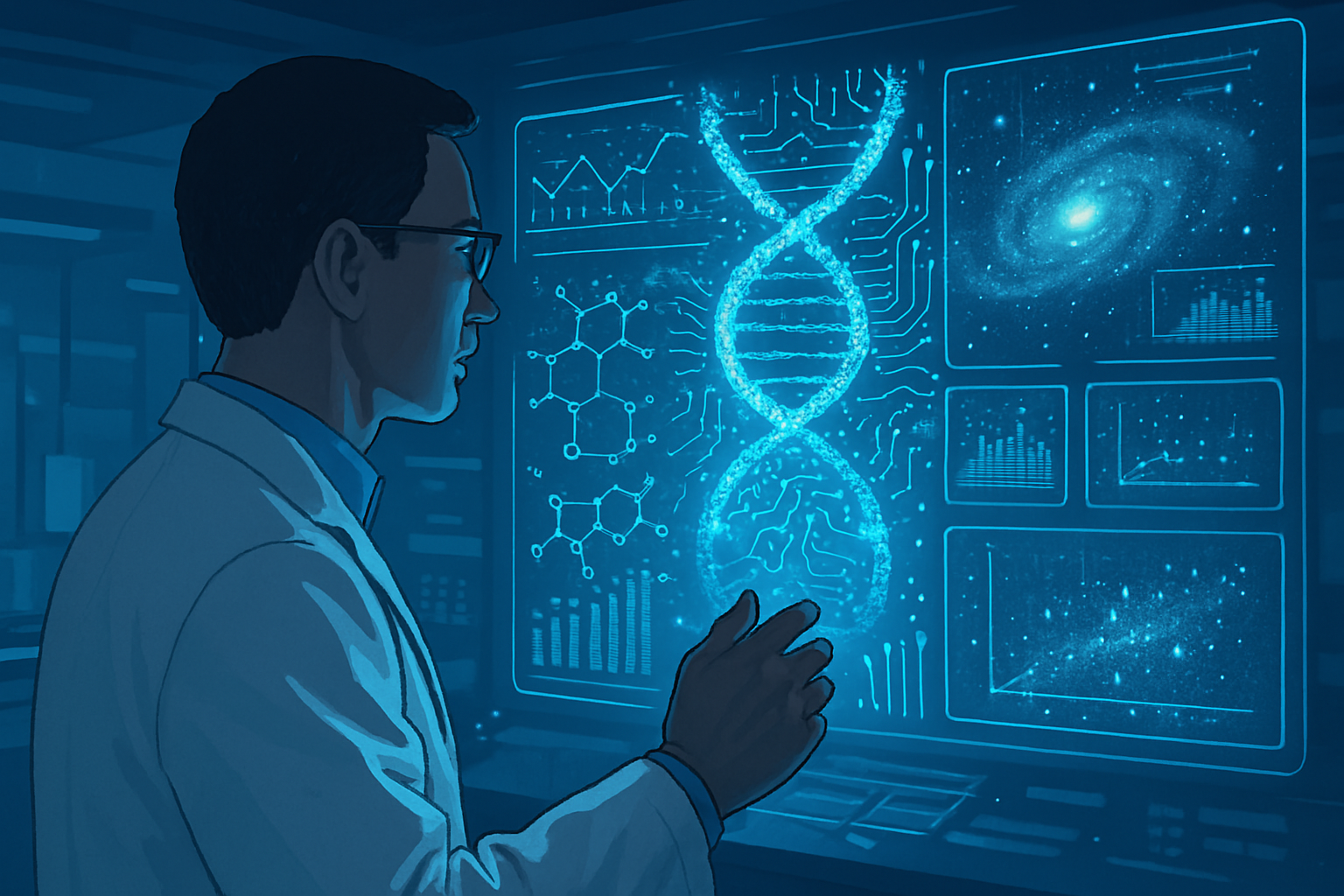
The Role of AI in Scientific Discovery: Accelerating Research and Innovation
Introduction: AI as a Catalyst for Scientific Breakthroughs
Artificial Intelligence (AI) is rapidly emerging as a transformative force in scientific discovery, acting as a powerful catalyst that accelerates research, uncovers novel insights, and pushes the boundaries of human knowledge across diverse fields. From unraveling the complexities of biological systems to designing new materials and modeling intricate global phenomena, AI algorithms are processing vast datasets, identifying patterns invisible to the human eye, and generating hypotheses at an unprecedented scale. This article explores the pivotal role of AI in accelerating scientific research and fostering innovation, examining its applications in key domains, highlighting potential affiliate opportunities for relevant software and platforms, and acknowledging the challenges that accompany its integration into the scientific method.
AI in Drug Discovery and Development: From Molecules to Medicines Faster
The pharmaceutical industry faces immense challenges in bringing new drugs to market, a process that is traditionally long, expensive, and fraught with high failure rates. AI is revolutionizing this pipeline.
- Target Identification and Validation: AI algorithms can analyze biological data (genomics, proteomics, metabolomics) to identify novel drug targets and validate their relevance to specific diseases.
- Molecule Design and Screening: AI can predict the properties of chemical compounds, design novel drug candidates de novo, and virtually screen vast libraries of molecules for potential efficacy and safety, significantly speeding up the initial discovery phase.
- Clinical Trial Optimization: AI can help optimize clinical trial design, improve patient recruitment by identifying suitable candidates from electronic health records, and predict trial outcomes, potentially reducing timelines and costs.
- Leading Platforms (Examples & Affiliate Opportunity): Companies like BenevolentAI, Exscientia, and Insilico Medicine are at the forefront of AI-driven drug discovery. Software platforms for molecular modeling, bioinformatics analysis (e.g., Schrödinger, Benchling), and data management for life sciences could also offer affiliate potential.
AI in Materials Science: Designing the Future, Atom by Atom
The discovery and design of new materials with specific properties are crucial for advancements in numerous industries, from electronics to energy. AI is accelerating this process.
- Predicting Material Properties: AI models can learn from existing materials data to predict the properties (e.g., strength, conductivity, stability) of new or hypothetical materials, reducing the need for extensive trial-and-error experimentation.
- Accelerated Material Discovery: AI can guide high-throughput screening experiments and suggest novel material compositions or structures with desired functionalities.
- Optimizing Manufacturing Processes: AI can be used to optimize the synthesis and processing of materials, improving efficiency and quality control.
AI in Climate Change Modeling and Environmental Science: Understanding Our Planet
Addressing climate change and environmental challenges requires sophisticated modeling and data analysis capabilities, where AI plays an increasingly vital role.
- Improving Climate Models: AI can enhance the accuracy of climate models by better representing complex interactions within the Earth’s systems and by processing vast amounts of satellite and sensor data.
- Predicting Extreme Weather Events: Machine learning algorithms can improve the forecasting of hurricanes, floods, droughts, and wildfires, providing earlier warnings and aiding in disaster preparedness.
- Monitoring Environmental Changes: AI can analyze satellite imagery and sensor networks to track deforestation, monitor biodiversity, detect pollution events, and assess the health of ecosystems.
- Developing Mitigation and Adaptation Strategies: AI can help identify optimal locations for renewable energy deployment, design more sustainable agricultural practices, and model the effectiveness of different climate policies.
AI in Astronomy and Space Exploration: Unveiling the Cosmos
The sheer volume of data generated by modern telescopes and space missions necessitates AI for efficient processing and discovery.
- Processing Telescope Data: AI algorithms can sift through massive astronomical datasets to identify faint signals, classify celestial objects (galaxies, supernovae, exoplanets), and detect anomalies.
- Assisting in Mission Planning and Operations: AI can optimize spacecraft trajectories, manage autonomous rovers on other planets, and assist in scheduling observations for space telescopes.
- Searching for Exoplanets: Machine learning is a key tool in analyzing light curves from stars to detect the subtle dips that indicate the presence of transiting exoplanets.
AI in Genomics and Bioinformatics: Decoding the Blueprint of Life
The explosion of genomic data has created immense opportunities for AI to advance our understanding of biology and medicine.
- Analyzing Genetic Sequences: AI can identify genes, predict their functions, understand gene regulation, and analyze complex genetic variations associated with diseases.
- Understanding Disease Mechanisms: By integrating genomic data with other biological and clinical information, AI can help elucidate the molecular mechanisms underlying diseases.
- Developing Personalized Medicine: AI plays a crucial role in tailoring medical treatments to an individual’s genetic makeup and specific disease characteristics.
Challenges in AI-Driven Scientific Discovery
Despite its immense potential, the application of AI in science faces several challenges:
- Data Requirements and Quality: Many AI models require large, high-quality, and well-curated datasets, which may not always be available or easily accessible in all scientific domains.
- Model Interpretability (Explainability): The

Leave a Reply